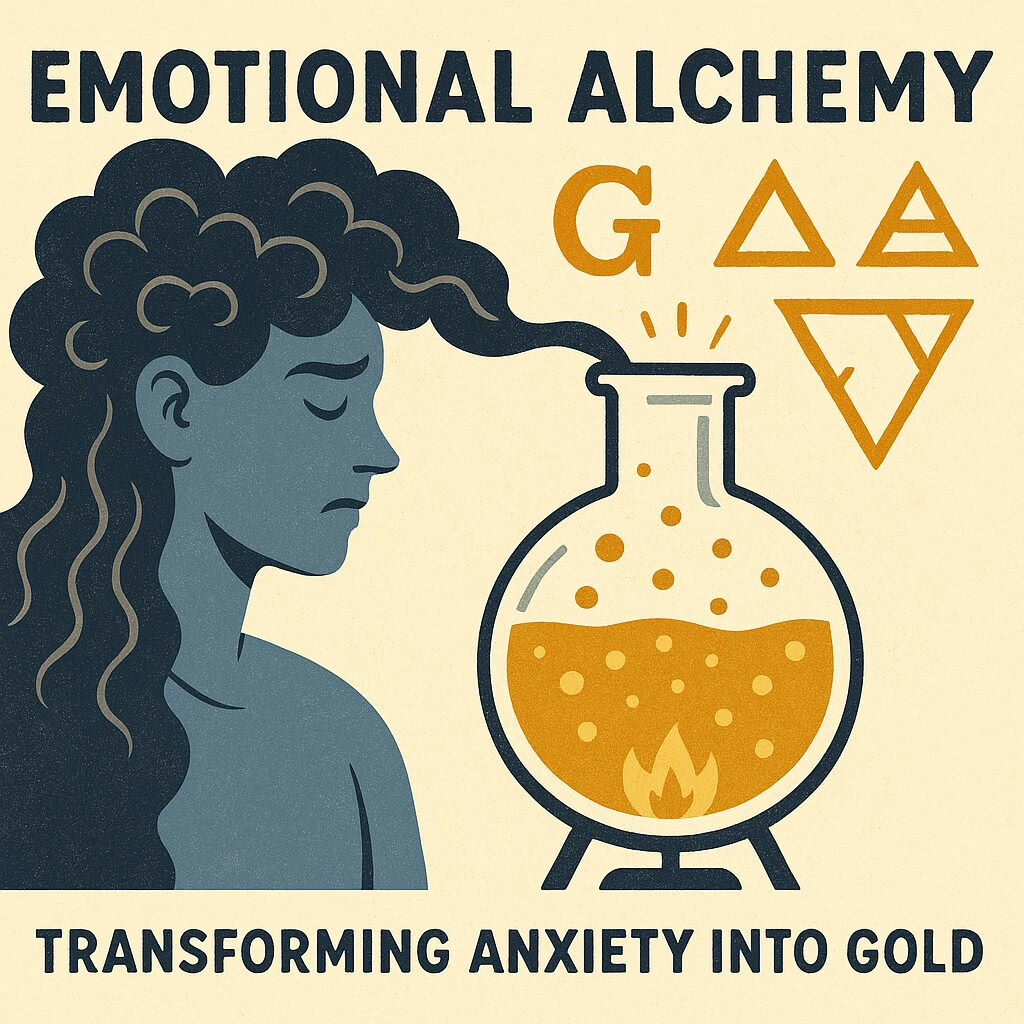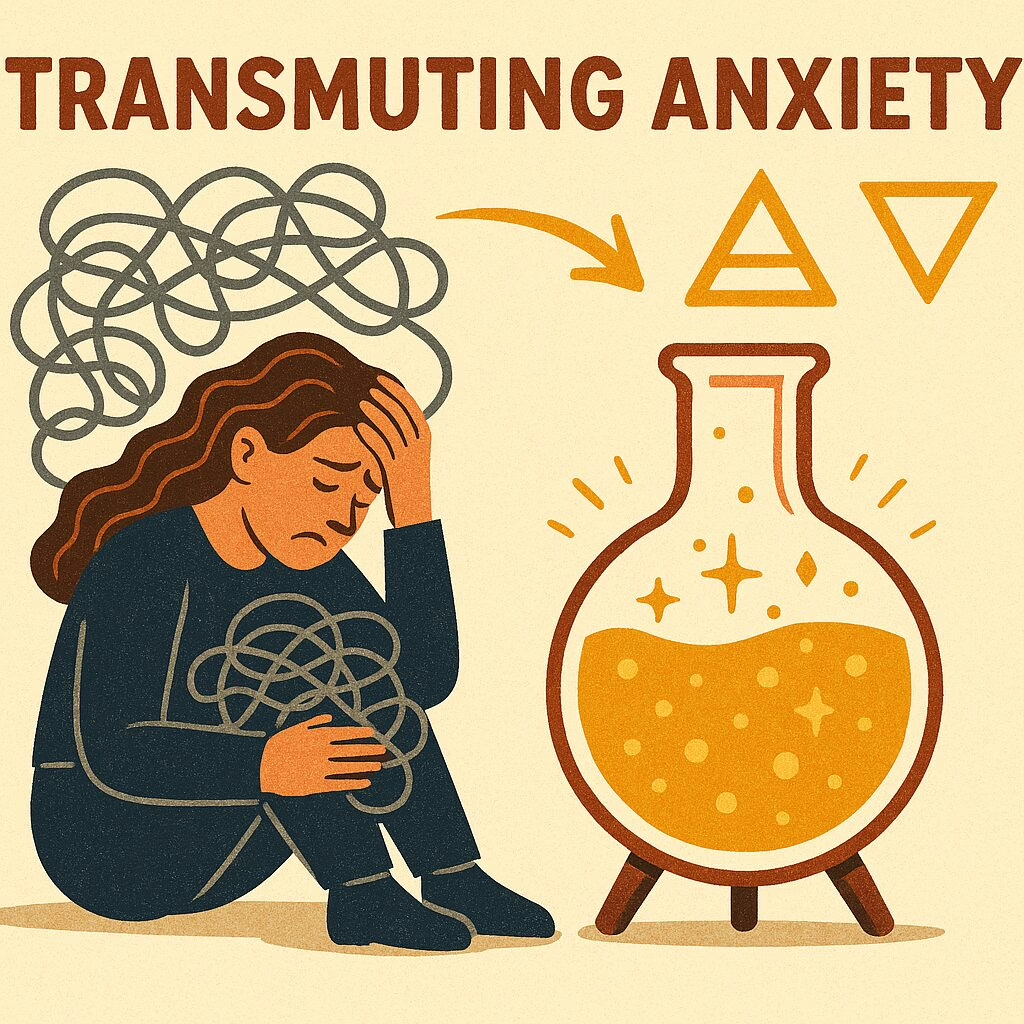Emotional alchemy doesn’t banish anxiety you transform it. Rather than suppress or rationalize, you honor anxiety as a messenger and refine it into clarity and inner balance.
🧪 What Is Emotional Alchemy?
Emotional alchemy is a symbolic transformative process not about turning lead into gold, but about refining heavy feelings into insight and wholeness. Carl Jung embraced this metaphor: psychological work as internal alchemy, guiding the soul toward individuation and self-realization Medium.
He believed in addressing emotions at all levels physical, psychological, and spiritual to undergo a full transformation, much like ancient alchemists did with metals PMCpacifica.libguides.com.

Why Standard Advice Can Fail
When people face anxiety, they’re often offered tired advice:
- “Stop worrying, it won’t help.”
- “Others have it worse.”
- “Move on.”
But anxiety isn’t rational. Even helpful affirmations like “just pretend to be confident” often only offer a superficial fix rooted in ego, not true transformation.

Anxiety as Obsessional Weight
Especially in cases of obsessional anxiety, characterized by intrusive, repeating thoughts the problem resists logic or persuasion mayoclinic.org+15my.clevelandclinic.org+15mcleanhospital.org+15. Instead, we can treat this mental reinforcement like overgrown “lead”: heavy, distorting, and in need of refinement.
Rather than suppressing it, emotional alchemy encourages breaking it down into smaller, manageable fears. Then, you can explore and heal each piece individually.
The Three Alchemical Stages of Transformation
Jungian-inspired emotional alchemy involves three core stages:
1. Inspection (Nigredo)
This is the fire phase, where hidden beliefs, emotions, and habits rise to the surface. You shine a light on what was unconscious, without blame so you can begin to dissolve what no longer serves. This may require quiet focus, journaling, or dedicated reflection time.
Key qualities:
- Naming and accepting anxiety directly
- Slowing down daily life to observe internal patterns
- Comfort with sitting in emotional chaos without rushing fixes
2. Confrontation (Alembic)
In this refining phase, you sift through what surfaces sort what to carry forward and what to let go. This involves shadow work and support from trusted frameworks like therapy, dreamwork, or writings by Jung, Andrew Harvey, or Caroline Myss.
Essential steps:
- Identifying recurring obsessions or mental loops
- Disengaging from people, routines, or thought habits that exacerbate anxiety
- Welcoming neglected parts of yourself and integrating them
3. Renaissance (Rubedo)
Here, you emerge renewed lighter, more grounded, and connected. You may feel tentative at first, like relearning how to stand. With supportive relationships and continued self-care, anxiety becomes a signal, not dominance over your life.
Alchemical Healing Applied to Obsessional Anxiety
With obsessional anxiety harm, relationship fears, unwanted intrusive thoughts the alchemical approach is powerful. Rather than battling the thoughts, you observe them and treat them as transformation material.
- Use Inspection to notice repetitive mental rituals and label them without shame.
- In Confrontation, gently interrogate what beliefs fuel them often perfectionism, control, or guilt.
- Through Renaissance, find new meaning: the obsessions stop defining you; instead, you shape them into deeper insight about your values and vulnerabilities.
Summary Table: Transforming Anxiety via Emotional Alchemy
| Stage | Focus | Purpose |
|---|---|---|
| Inspection | Illuminate hidden anxiety | Discover patterns |
| Confrontation | Sort, release, integrate | Transform fears into conscious healing |
| Renaissance | Rebirth with lighter energy | Harness renewed self-awareness and balance |

FAQ: Emotional Alchemy & Obsessional Anxiety
What is emotional alchemy?
A symbolic process to transform intense emotions, like anxiety into insight and inner peace.
Can it help obsessions in OCD?
Yes. Especially with obsessional anxiety, breaking thoughts down and transforming them with emotional alchemy supports awareness and healing.
Does logic work on anxiety?
No. Anxiety and obsessive thoughts resist logic. Emotional alchemy works through exploration, not denial.
How long does the process take?
It varies. Some may feel change in weeks, others months. Depth, consistency, and support matter.
Is professional help needed?
Often yes. Therapists familiar with Jungian or CBT-based shadow work can greatly support alchemical transformation.
Conclusion
Anxiety even obsessive fears is not a flaw to erase. It is raw material for transformation. Through inspection, confrontation, and rebirth, you refine anxiety into clarity and renewed energy. Emotional alchemy offers a meaningful way to transmute your inner lead into gold.
